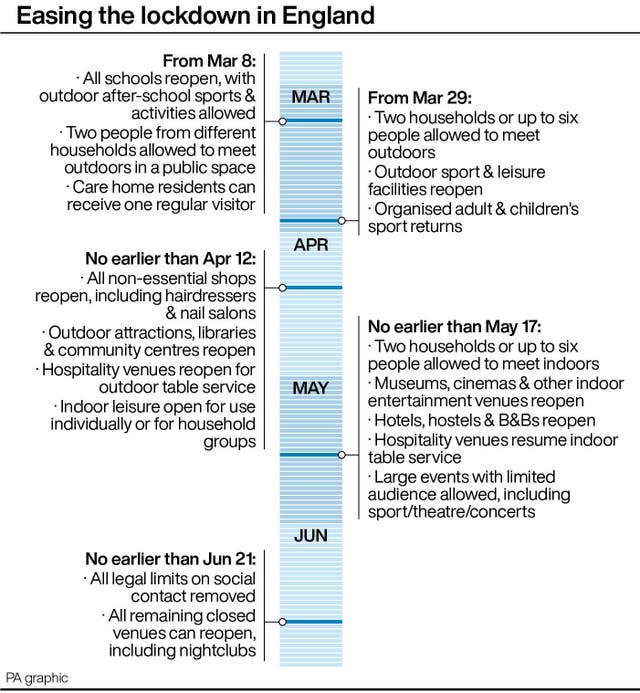What are the plans for reopening schools and colleges in England?
Secondary school students will be asked to take part in regular asymptomatic Covid-19 testing when they return.

Prime Minister Boris Johnson has unveiled how lockdown measures will be eased in England – including allowing pupils to return to class in a fortnight.
Here is how it will work, based on what we know so far:
– Will all pupils in all year groups return to school at the same time?
Boris Johnson has said all pupils in England will go back to class from March 8.
It comes after pupils in schools and colleges – except children of key workers and vulnerable pupils – were told to learn remotely during the lockdown.
A coalition of unions and professional bodies had called for a phased approach to be taken as they said bringing all pupils in all age groups back at same time risked triggering a fresh wave of infections.
The Department for Education (DfE) has said attendance for all pupils will be mandatory when schools reopen to more children from March 8.
– Will the return of secondary school and college students be staggered?
School and college leaders will be given some flexibility to stagger the return of students due to the logistics of mass symptomatic coronavirus testing.
Secondary schools and colleges will have discretion on how to phase the return of their students over the week beginning March 8 to allow them to be tested before returning to the classroom.
But the Association of School and College Leaders said their return may need to be staggered over at least two weeks due to the “huge logistical challenge”.
All primary school children will return on March 8 and they will not need to take a rapid coronavirus test.
– How will the mass testing system in schools and colleges work?
More than three million rapid coronavirus tests have been carried out among school and college staff and pupils in England – those who have been attending class during the lockdown – since January.
Students in secondary schools and colleges will be asked to use a lateral flow device when they return from March 8 – and if they test negative, they will be allowed to resume face-to-face classes.
Over the first two weeks of term, pupils in secondary schools and colleges will be asked to take three Covid-19 tests on site and one at home.

After the initial testing of students in a supervised environment, parents, carers or the students themselves will carry out twice-weekly tests at home.
Schools and colleges will be asked to provide small testing facilities for those children whose do not have the support to carry out testing at home.
The tests are voluntary and the system is based on trust.
Last week, Mary Bousted, joint general secretary of the National Education Union (NEU), warned parents may not want to test their children at home as it could have implications for their work.
She added that there were “many challenges” about the accuracy of lateral flow tests that the Government would have to make a “compelling” explanation about why they should be carried out.
– Are additional safety measures being introduced?
Secondary school and college students and staff are being advised to wear face coverings in all areas, including classrooms, where social distancing cannot be maintained under protective measures.
Extending the use of face masks to classrooms will be in place until Easter – and it will be kept under review.
Boris Johnson said the additional safety measure – alongside the twice-weekly testing of secondary school and college students – would “offer even greater reassurance” that returning to face-to-face teaching was safe.
The National Deaf Children’s Society has warned that the Government’s recommendation will have a “devastating” effect on deaf youngsters.
But the DfE has said teachers should continue to be sensitive to the additional needs of their students, such as deafness, in deciding whether it is appropriate to wear a face covering.
– How does England’s reopening plans differ to the devolved nations?
In Scotland, children between the ages of four and eight in primaries one to three began returning to school from Monday, along with some senior secondary pupils who need to do practical work.
Children aged between three and seven also started a phased return to school in Wales on Monday, and some vocational learners were back at college for their practical qualifications.
All primary school pupils, as well as older age groups in Years 11 and 13 who have exams, could return from March 15 in Wales, while all secondary school students could be back after Easter, depending on the coronavirus situation.
Some primary school pupils in Northern Ireland will return to class on March 8, while secondary pupils in key exam years will return to school on March 22.





